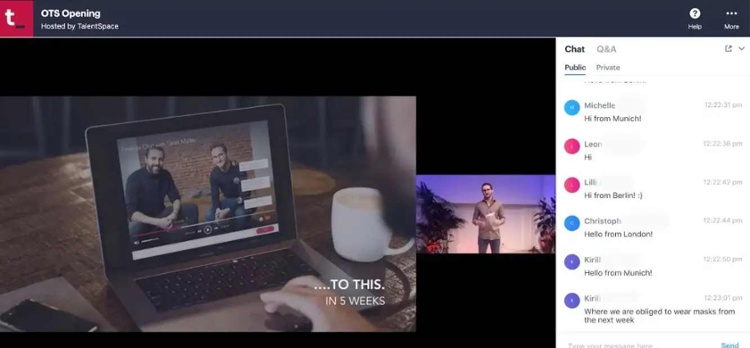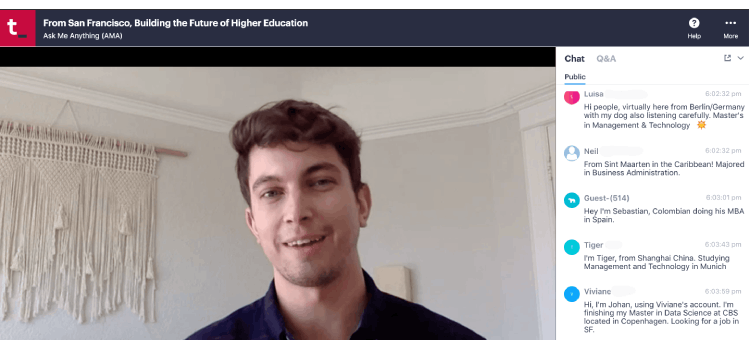When the COVID-19 pandemic hit Europe in early March, it triggered a wave of cancellations: sports games, concerts, exhibitions, and, of course, recruiting events. Hiring fairs were postponed; networking meetups were rescheduled to the autumn. Over the last few weeks, companies have been forced to reassess once more, as the likelihood of a longer period of isolation and perhaps even second waves of the virus sends the idea of life-as-usual receding further out of reach.
At Talentspace, we’ve spent the last three years designing graduate recruiting events, linking Europe’s brightest talents with its most exciting companies. Like other event organizers, the coronavirus crisis forced us to reevaluate everything we were doing — especially with our popular annual Berlin Talent Summit planned for April. But instead of cancelling, we made the decision to take all our offline knowledge online and launch Europe’s largest fully digital recruiting event.
It took five weeks, a young startup mentality, and a lot of sweat and tears. But on April 24th, we hosted close to 1000 young talents and 40 companies for a day of connections, insights, and advice. The Online Talent Summit (OTS) featured four keynote speeches, 90+ insight sessions, virtual career booths, 400+ one-to-one chats between talents and employers, and one live DJ set to send us out on a high note (we are in Berlin, after all).
If the OTS taught us one thing, it’s that digitizing recruiting events will be met with hunger and excitement from companies and talents alike - but it’s not as simple as throwing everyone into a Zoom session. If the OTS taught us more than one thing - well, here they are.
Build the right platform
We weren’t starting from scratch in the recruitment industry to create the Online Talent Summit - we already had a community of engaged talents who wanted to be part of the day and a network of companies who work with us. That made it easier to reach out, explain the change in circumstances, and reopen applications to join the OTS. But we still had to build the space itself.
Rather than sending out hundreds of Zoom links, we wanted to rethink the whole online event experience. We weren’t after a single tool, but rather something that could create an online experience from an offline experience we know so well. In five short weeks, our engineering team built a live event online platform that combined a lot of our favorite apps - Zoom, Slack, Calendly, LinkedIn - into one. The idea was to build something that was not circumstantially useful for recruiting events, but specifically designed to host and connect talents and employers.
Before we’d even finished building the platform, other recruiting event organizers, such as university career centers and career fair organizers became interested in the product we were developing. It was quickly clear that our first lesson out the gate was that in building a solution for our own problem, we’d created an offering that was attractive to many more organizations than just ourselves. We know first-hand how difficult organizing an online event can be, so we focused on making the platform easy to use and accessible for other users who need it… and who are now realizing that we may not be going back to offline events anytime soon.

Exploit the opportunity
Event organizers were in dire need of a digital shake-up. While the offline experience is invaluable, event organizers haven’t seen the reason to go digital yet. “If it’s not broke, don’t fix it,” is a difficult mindset to challenge.
But unfortunately, during the new circumstances we’re living under, the same old approach won’t work anymore. Although this is an anxious and upsetting time for everyone, it does also offer opportunities to gently nudge event organizers across recruitment - at universities, at career fairs, at smaller startups and big corporates alike - in the right direction. Everyone’s work lives are changing; processes that seemed ingrained are suddenly more flexible than we thought.
The move online was greeted with interest by companies including Porsche, Microsoft, and Google. Online recruitment stands up well to a cost-benefit analysis for companies who have traditionally paid up to thousands of Euros for one stand at a recruitment fair. There’s also the cost of capacity: it’s much easier to jump on a thirty-minute video call from wherever you are in the world than spend half a day travelling to and from a single event.
With the fear factor removed for organizers and the ease and attraction enhanced for companies, we see a huge future for online events even post-pandemic.
Appreciate the accessibility
The importance of online events in terms of accessibility can’t be overstated. The most exciting thing about building the OTS was realizing that we were suddenly opening up our audience and reaching whole new groups of people, no longer restricted by distance, disability or socioeconomic factors.
Online events, of course, have much lower overheads than a physical offline event; they also lose the costs associated with attending one. And it means that attendees aren’t restricted to companies in their own locality. If you’re based in Berlin, for example, an online event makes it much easier to connect with companies in London. This means that people on tight budgets or struggling financially will have greater opportunities to join the same conversations and share the same learnings as their peers.
Equally, online events are much more accessible for people with disabilities who might find physical travel difficult. And we found that an unexpected effect of the OTS was lowering social anxiety: it was less scary for participants to engage with companies or people that they admired with the safety of a screen in the way. Text-based questions were simple and clear, cutting the old ramble time in half, and in general, we saw the quality of interaction go up in an online setting.
Losing the constraints of distance was also a great bonus for an online event. It meant that our attendees and speakers joined from all over Europe - and, indeed, further. Our final insight session, hosted by Christian Rhally from LinkedIn’s Product Strategy & Business Operations team, was at 6.30 PM Berlin time, and 9.30 AM in Christian’s base in San Francisco.
He’d just finished his breakfast; we were about to break for celebratory beers. But across the Atlantic, tips and thoughts zipped back and forth. And that’s without any carbon outputs: the effect of everyone staying home and connecting online is, of course, also hugely beneficial for the environment.

Get ready to learn
Launching any new product means getting ready to make mistakes. We were sure that there would be big things for us to learn after watching how our platform worked in real time with real people. One of our first priorities was to gather feedback from participants and companies, and our engineering team is already hard at work improving the product further. But it’s also been interesting for us to look at from a higher level. Some of the lessons we took from the OTS are useful for us specifically. Others are more interesting from a cultural perspective as something that others will have to wrestle with, too.
One big takeaway was that no matter the possibilities an online space offers, there’s nothing that replaces the conversation you make at the bar, or in a queue, or waiting for an event to start. Unfortunately, there’s no answer to those genuine offline connections that you can make on the basis of a shared smile or a pin on someone’s bag that you recognize.
What online recruiting spaces can - and must - do is build something that allows people to find the connections they’re looking for. An online networking space is part of the post-OTS 2.0 Talentspace platform that we launched this week, to allow people to share their details, find those common connections, and start conversations that might spark into something more. It’s all part of the journey we’re making into creating safe, productive, and sustainable online practices.